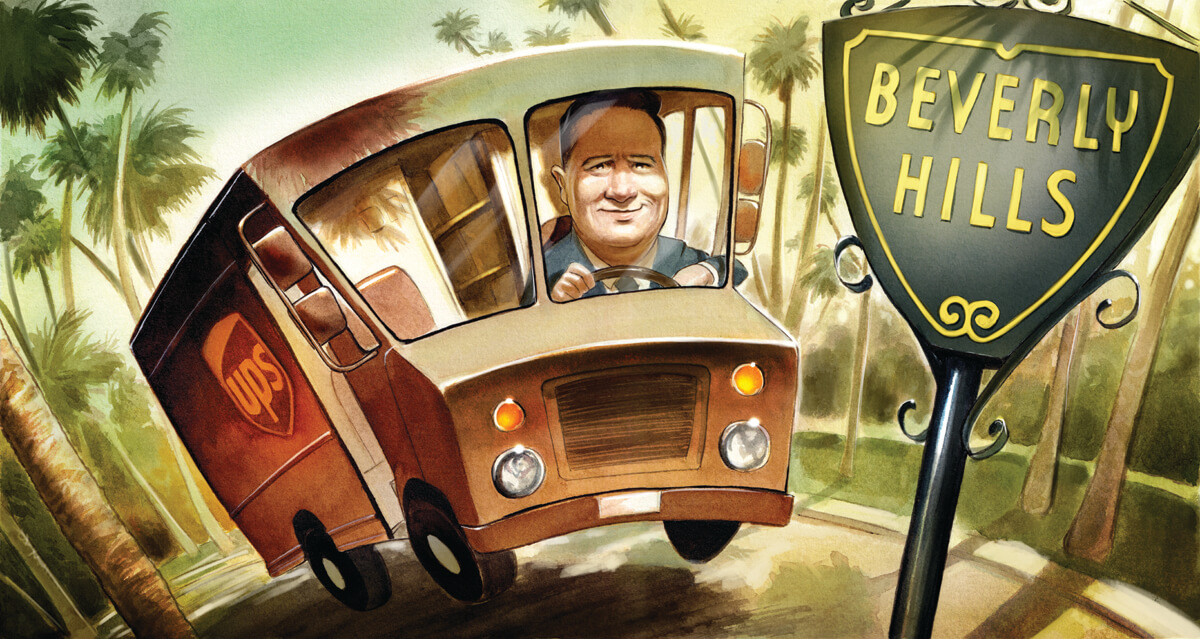From UPS Driver to the C-Suite
The UPS delivery van. Each day countless people patiently wait for these iconic brown trucks to pull up at their house or office with a bounty of parcels, gifts and online purchases. But for one former UPS driver, the humble truck he drove around Beverly Hills was the key to an illustrious 30-year career that now finds him overseeing a multibillion-dollar budget as UPS’s chief information and engineering officer.
At USC Viterbi, Juan Perez earned a B.S. in industrial and systems engineering in 1988 and an M.S. in computer and manufacturing engineering in 1990. He comes from a long line of engineers. His grandfather was a civil engineer in Cuba; his father was a textile engineer; and his brother, Antonio R. Perez, is a fellow Trojan who graduated in 1992 with a B.S. in electrical engineering. Perez’s parents were forced to give up everything after the Cuban revolution and left Cuba in 1963. They came to the United States but eventually settled in Mexico, where his father built a successful industrial uniform manufacturing business entirely from scratch. It was an inspiring environment for the fledgling engineer.
“My parents never insisted that I become an engineer,” Perez said. “I liked solving problems. I saw my dad solving problems all the time. I always felt engineers offered great value to society, solving really complex problems to make the world a better place.”
As the young Perez’s thoughts turned toward studies, he took the opportunity to explore his future college, walking around the USC campus while visiting family in Los Angeles.
“Even in those days I could sense that the university respected diversity and created a great environment for people to learn,” he said.
He was drawn to industrial engineering, with its focus on improving efficiency to help an organization function effectively. When Perez started at USC, he had the support of mentors including Berok Khoshnevis, Louise L. Dunn Endowed Professor in industrial and systems engineering; Najmedin Meshkati, professor of civil and environmental engineering; Professor Emeritus Gerald Fleischer; and the late Professor Gerald Nadler.
Meshkati said working with Perez has been one of the highlights of his academic career.
“Juan was one of the most impressive young men I had ever met in my life,” he said. “He was so dedicated, focused, organized and a loyal former student.”
Khoshnevis added that Perez was an intelligent, sincere and exceptional student who left a lasting impression during his time at USC.
“The first thing about Juan that attracted my attention was his amazingly organized notebook and tidy handwriting,” Khoshnevis said. “Later, I noticed that the polite and pleasant way he conducted himself closely corresponded to how his notebook looked.”
It turned out USC would also lead to Perez’s introduction to his future employer. While working as a teaching assistant, Perez helped coordinate student senior design capstone projects, which meant reaching out to industry professionals. He made a strong impression on his contacts at UPS, who offered him a job on graduation.
His first manager put him straight to work, offering him a new role developing technology projects, while also gaining firsthand experience of day-to-day operations by loading trucks. Pretty soon, Perez was enlisted as a UPS driver. His turf: the leafy streets of Beverly Hills.
“It actually taught me something very important, Perez said. “To be successful in any job you do in industrial engineering, you have to understand what the company does. What better way to learn than by actually doing the job from the ground up.”
Perez’s career has run the gamut at UPS, from operations, process management and technology to the organization’s corporate, U.S. and international business units. In 2016, Perez was named chief information officer, after serving as vice president of technology. In his current role as chief information and engineering officer, he is responsible for more than 23,000 employees across engineering and technology at UPS. He led the Orion Project, an ambitious initiative that draws on historical UPS delivery route data to create optimized custom wayfinding for drivers. Orion has cut carbon emissions, improved delivery times and brought impressive savings to the company — Perez estimates up to $400 million per year. He is also a champion of integrating new technologies, such as artificial intelligence, virtual assistants and virtual reality for driver training.
His achievements have brought him many accolades, among them the Distinguished Mexican Award in 2018 from the Mexican government.
Perez is also heavily involved in UPS’s Latino Business Resource Group, which promotes diversity across the enterprise.
“It’s one of my favorite things to engage with. For our company to be successful, we need to include everyone’s voice in the solutions we need for today and for the future,” Perez said.
Perez said that over the course of his life there are three things he has had no regrets about.
I always tell my wife, one is the fact that I married her! Two is that I chose USC to go to school, and three, that I picked UPS as the company I would build my career in,” he said.




